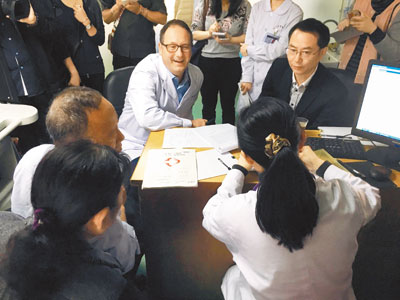
Zhang Yang
nicolezyyy@163.com
TWO Australian doctors started their first day of work treating patients at the Shunlitian community clinic in Luohu District on Thursday, along with offering on-the-spot training to Chinese doctors on how to be general practitioners, as opposed to specialists that work in large hospitals.
Dr. Grant Blashki, an associate professor at the Nossal Institute for Global Health of the University of Melbourne, has been a general practitioner for more than 20 years. He has conducted research into mental health, environmental health and global health.
Blashki talked to patients while his co-worker, Prof. Yang Hui, translated for him. Yang is a senior research fellow at Monash University in Australia. He worked at Peking University for 17 years as a researcher and teacher in health care before moving to Australia.
During the consultation, one senior patient with heart disease, surnamed Huang, said he considered turning to traditional Chinese medicine because he was worried about the side effects of Western medicine.
“It’s good to be careful or cautious with medicine,” Blashki said, before explaining to Huang that scientific studies had proven the effectiveness of certain medicine for managing heart disease.
When Huang asked whether he could avoid heart operations if he kept taking the medicine, Blashki said it’s essential to consult doctors before making any decision.
“If you were my father, I would say it’s still important to have discussions [with doctors],” Blashki said.
Both doctors were invited by the Luohu Hospital Group, which was founded in August last year to manage all hospitals in the district, as a step towards improving medical services at community clinics and easing the burden on large hospitals.
Sun Xizhuo, spokesperson for the Luohu Hospital Group, said one more experienced general practitioner from overseas and 30 others from around China will be invited to community clinics in Luohu District this year.
He added they will be responsible for treating patients and training about 200 doctors to serve as general practitioners.
According to Sun, China lacks experience with general practitioners and the country is exploring its own system while drawing experience from overseas. He said many medical school graduates are want to work at large hospitals for higher pay and a better working environment, which he hopes will change.
Blashki said general practitioners can play a significant role educating and explaining things to patients to resolve their worries.
“Actually the patients we saw today were patients who had advice from hospitals, but they were still a little bit confused and scared about what to do,” he said.
According to Blashki, general practitioners can usually offer continuity of care.
“Also, the general practitioner doesn’t only have to treat disease but can do a lot of work on prevention,” he said, adding that these doctors can help people develop healthier living habits.
Blashki said he and Yang would teach Chinese doctors not only clinical skills but also leadership and research skills during the training, because they think these doctors will become leaders as general practice grows in China.
“That’s why we started the training in Shenzhen, because we know Shenzhen has a big reputation for innovation and leading with new models and exploring new ways of doing things,” he said.
In the coming two weeks, both doctors will accept patients at eight clinics in the Hujing, Liantang, Tianbei, Sunlitian, Wutongshan, Dongmen, Jinpeng and Lianhua communities. The consultation fee for seeing the doctors will be the same as Chinese doctors at community clinics: 10 yuan, but each doctor will only receive 12 to 15 patients each day.
|

